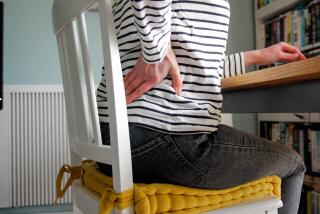Op-Ed: The ‘it’s all in your head’ diagnosis is still a danger to women’s health

- Share via
TV personality Maria Menounos stunned fans when she announced this month that she was in recovery from surgery for a nonmalignant brain tumor, which she discovered while her mother was battling brain cancer. Perhaps most surprising was how quickly Menounos was treated. She explained to People magazine that when she told her mother’s doctor about her symptoms — headaches, dizziness, slurred speech — he immediately investigated what was wrong.
Many women are not so lucky. As medical technology improves, proper diagnosis still depends on doctors asking their patients the right questions, and taking their answers seriously. Too often, gender bias get in the way.
Although there have been no major studies on the misdiagnosis of nonmalignant brain tumors, women I’ve met in support groups said it took months or years before they received an accurate assessment — even though women are more than twice as likely as men to develop these kinds of noncancerous growths.
In my case, it took four years and several doctors before I learned that I had a meningioma, the same type of nonmalignant tumor that Menounos had. By then, the mass in my skull had grown to be the size of a baseball, causing permanent problems and making surgery much more dangerous.
Some 40% of women who eventually are found to have a serious autoimmune disease have been told by a physician that they are complainers.
Even after my diagnosis I had to contend with dismissive, condescending doctors. While I was in the hospital recovering from a complicated brain surgery, I suddenly experienced muscle spasms. A young male doctor watched me convulse and intoned: “We don’t know what’s wrong with you — but we think the problem is all in your head.” If I hadn’t been shaking uncontrollably, I might have laughed. (A female nurse correctly speculated that I was having a bad reaction to post-surgery steroids, given to reduce brain swelling.)
The “all in your head” misdiagnosis is still amazingly common. Doctors dole it out for neurological, autoimmune and even cardiac problems; they sometimes refer women for psychological evaluations before addressing their physical symptoms. Menounos may have had such horror stories in mind when she thanked her doctor on Twitter for “…not making me feel like I was crazy.”
Doctors may fail to appreciate their female patients’ symptoms in part because medical research has historically focused on men. Heart disease is the leading cause of death among women, but, according to Harvard Health Publications, “many women say their physicians never talk to them about coronary risk and sometimes don’t even recognize the symptoms, mistaking them instead for signs of panic disorder, stress, and even hypochondria.” A 2014 study from Johns Hopkins University found that women having a stroke were 30% more likely than men to be misdiagnosed in the emergency room.
Women with autoimmune disease struggle perhaps most of all to find appropriate care. The American Autoimmune Related Diseases Assn. estimates that about 50 million Americans have one of the 100 known autoimmune diseases, in which the body mistakenly attacks itself. For reasons that researchers are struggling to unravel, 75% of those afflicted are women. According to the association’s research, on average patients see four doctors over three years before receiving a correct diagnosis.
The association’s president and executive director, Virginia Ladd, says that the number one concern among women with autoimmune disease is that doctors don’t listen to them. Indeed, some 40% of women who eventually are found to have a serious autoimmune disease have been told by a physician that they are complainers or simply too concerned with their health. When these women finally find out what’s wrong, they are thankful, even if they know for certain that they have a chronic condition. “Finally, somebody listened to them,” said Ladd.
Elderly women have to contend with ageism on top of sexism. When my mother-in-law was in her 80s, she began to experience severe abdominal pain. She went from doctor to doctor, getting a variety of opinions and treatments, none of which worked to relieve her ever-worsening discomfort. At one appointment, the doctor made note of her age and flippantly asked, “What do you expect?”
What she expected — and deserved — was to be taken seriously and treated with respect. By the time she finally received an accurate diagnosis, the cancer was everywhere. If her doctors had listened to her, she might have been spared so much suffering in her final months.
Emily Dwass is a freelance health writer in Los Angeles.
Follow the Opinion section on Twitter @latimesopinion or Facebook
MORE FROM OPINION
John McCain rescued the Senate GOP healthcare bill. Can he rescue the Senate?
Want to be happier? Buy yourself more free time
In the absence of an actual Obamacare replacement plan, the GOP votes to debate ... no bill at all
More to Read
A cure for the common opinion
Get thought-provoking perspectives with our weekly newsletter.
You may occasionally receive promotional content from the Los Angeles Times.










